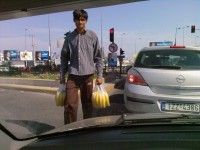Bananas make ends meet
 You can spot them in big roads around Athens, and usually you wave your hand negatively when the time comes.
You can spot them in big roads around Athens, and usually you wave your hand negatively when the time comes.
Han, the nineteen-year-old Pakistani who sells his bananas at the traffic lights of Stavros in Agia Paraskevi, didn’t want to talk in an interview.
He was obviously scared, thinking I might be some kind of threat, so he called somebody on the phone and asked me to speak with him.
The man on the phone said “OK, let me explain it to him,” and Han was given the green light to talk to do an interview in exchange for selling all of his bananas at once.
Han had lived in the slums of Karachi for 19 years before the need for money made him move to Greece. Back home, his eight brothers and his parents were in desperate need of money. His parents being old and in poor health, Han – as the oldest brother – moved here to find a job and support his family.
During his six months in Greece he has done a lot. At first he worked in construction in Piraeus, but after a month they dismissed him. Then he worked in Agioi Anargyroi at house cleaning, where they promised to pay him 25 Euros but gave him only 20 because, they said, he didn’t deserve more. After that he started selling bananas, but they don’t earn him more than 15 Euros a day.
“Back in Pakistan life is very different,” he said, looking oddly at my tape recorder. There is lots of “fighting, police, night gangs – everything is a problem.” Here in Greece “things are very good; here, very good,” without “kous-kous,” which later I learned it means “war.”
The only thing that worries him in Greece is employment, he said.
“Six days, six days on foot,” he responded, looking into my eyes, when I asked him how he had come to Greece. This man walked endlessly for six days, he walked about 1000 km and went through who-knows-what.
After leaving Karachi, he entered Iran and then walked across Iran to enter Iraq. From Iraq he went to Syria, where he boarded a ship sailing from the shores of Al Lathqiyah. It took three days for the ship to reach Greece; he wouldn’t say where they left him or how much he paid them.
He said he doesn’t miss Pakistan; he prefers being here, where “job is the only problem.” He has no plans to go home for a visit – traveling isn’t easy in his case.
Now he was sitting next to me in my car, with the air condition in his face, looking at his friends trying to wash my windshield. It must have felt awkward for him: when I told him to get in, he made for the back seat. He was not used to being given a lift.
It was 4 p.m. and he would work until 10. After I bought all his bananas, he thanked me and we shook hands. Now he was walking over to his friends, probably telling them that if they went to talk to me I’d buy their all their bananas.
I wish I could.